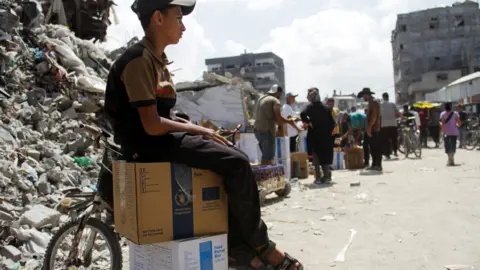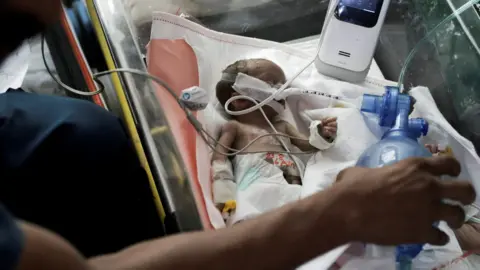UN says Gaza aid operation paused due to evacuation orders
 Reuters
ReutersThe United Nations says it has had to temporarily suspend its aid operation in the Gaza Strip because of Israeli military evacuation orders in the centre of the Palestinian territory.
A senior UN official told reporters that its humanitarian staff had been unable to operate on Monday because of safety concerns.
Evacuation orders covering parts of the Israeli-designated humanitarian zone in and around the central town of Deir al-Balah - where the UN has its main operations centre - had forced staff to relocate quickly and leave equipment behind, they said.
However, the official stressed that UN agencies would not be leaving Gaza and were now trying to find somewhere to operate safely.
The Israeli military has said it issues evacuation orders to try to protect civilians as it operates against Hamas and other armed groups.
Earlier on Monday, it said troops were continuing to “dismantle terrorist infrastructure” and “eliminate terrorists” on the outskirts of Deir al-Balah.
Up to 88.5% of Gaza has been placed under evacuation orders since the start of the war between Israel and Hamas, according to the UN, which is the primary provider and distributor of humanitarian aid in the territory.
That has forced an estimated 1.8 million people to shelter inside the humanitarian zone, which spans only about 41 sq km (15.8 sq miles) and lacks critical infrastructure and basic services.
The Israeli military launched a campaign in Gaza to destroy Hamas in response to an unprecedented attack on southern Israel on 7 October, during which about 1,200 people were killed and 251 others were taken hostage.
More than 40,430 people have been killed in Gaza since then, according to the territory's Hamas-run health ministry.
Local officials in Deir al-Balah say about 250,000 people have been forced to flee several neighbourhoods of the town since 16 August, when the Israel Defense Forces (IDF) started to issue evacuation orders there.
Humanitarian staff from various UN agencies, NGOs and service providers, along with their families, have also been displaced as a result of the orders.
The UN said a new order issued on Sunday that covered one block in the south of the town had affected 15 UN and NGO premises, as well as four UN warehouses.
"We're unable to deliver today with the conditions that we're in," the senior UN official said on Monday. "As of this morning, we're not operating in Gaza."
However, UN staff have been instructed to find solutions to allow operations to resume.
"We're not leaving because the people need us there," the official said. "We're trying to balance the need of the population with the need for safety and security of the UN personnel."
Sam Rose, a senior deputy field director for the UN agency for Palestinian refugees (Unrwa) who is in Deir al-Balah, warned that both UN staff and Palestinian civilians were “being squeezed into ever smaller areas of Gaza”.
“The humanitarian zone declared by Israel has shrunk. It is now about 11% of the entire Gaza Strip,” he told reporters in New York via video link. “This isn’t just 11% of land that is fit for habitation, fit for services, fit for life. These are sand dunes, these are crowded areas, where people are living cheek by jowl, doing whatever they can to get by.”
“It is precisely in these circumstances that polio has recently re-emerged in Gaza, with a small number of cases. It could spread very rapidly,” he added.
“Malnourished children. A decimated healthcare sector. Very poor water and sanitation. People living amid garbage, amid lakes of sewage. They’re stressed, they’re anxious, their immune systems are suppressed.”
Mr Rose said Unrwa and other UN agencies had been focusing their efforts on the polio vaccination campaign due to start this Saturday, which plans to inoculate more than 640,000 children and prevent an outbreak.
“The vaccines have come in. We’re calling for calm, for humanitarian pauses that will allow the vaccination programmes to pass and be implemented successfully.”
 Reuters
ReutersMédecins Sans Frontières (MSF) has also warned that the latest evacuation order in Deir al-Balah also affected areas close to al-Aqsa hospital, the town’s main medical facility.
The medical charity said in a statement on X that an explosion about 250m (820ft) from the hospital on Sunday had triggered panic, with many people choosing to leave afterwards.
“As a result, MSF is considering whether to suspend wound care for the time being, while trying to maintain life-saving treatment. From around 650 patients, only 100 remain in the hospital, with seven in intensive care unit, according to the ministry of health,” it added.
“This situation is unacceptable. Al-Aqsa has been operating well beyond capacity for weeks due to the lack of alternatives for patients. All warring parties must respect the hospital, as well as patients' access to medical care.”
Dr Anas Ibrahim, an emergency physician at the hospital, told BBC Arabic’s Gaza Today programme on Monday that the situation there was “indescribable”.
“As the evacuation news spread, patients with fractures and wounds all began to evacuate the hospital for fear of being exposed to an offensive,” he said.
“Feelings of terror, fear and panic have overwhelmed all people at the hospital. Everyone is afraid now... everyone is waiting to see what will happen.”
The IDF said the evacuation order did not include nearby hospitals or medical facilities and that patients and medical staff did not need to leave.
